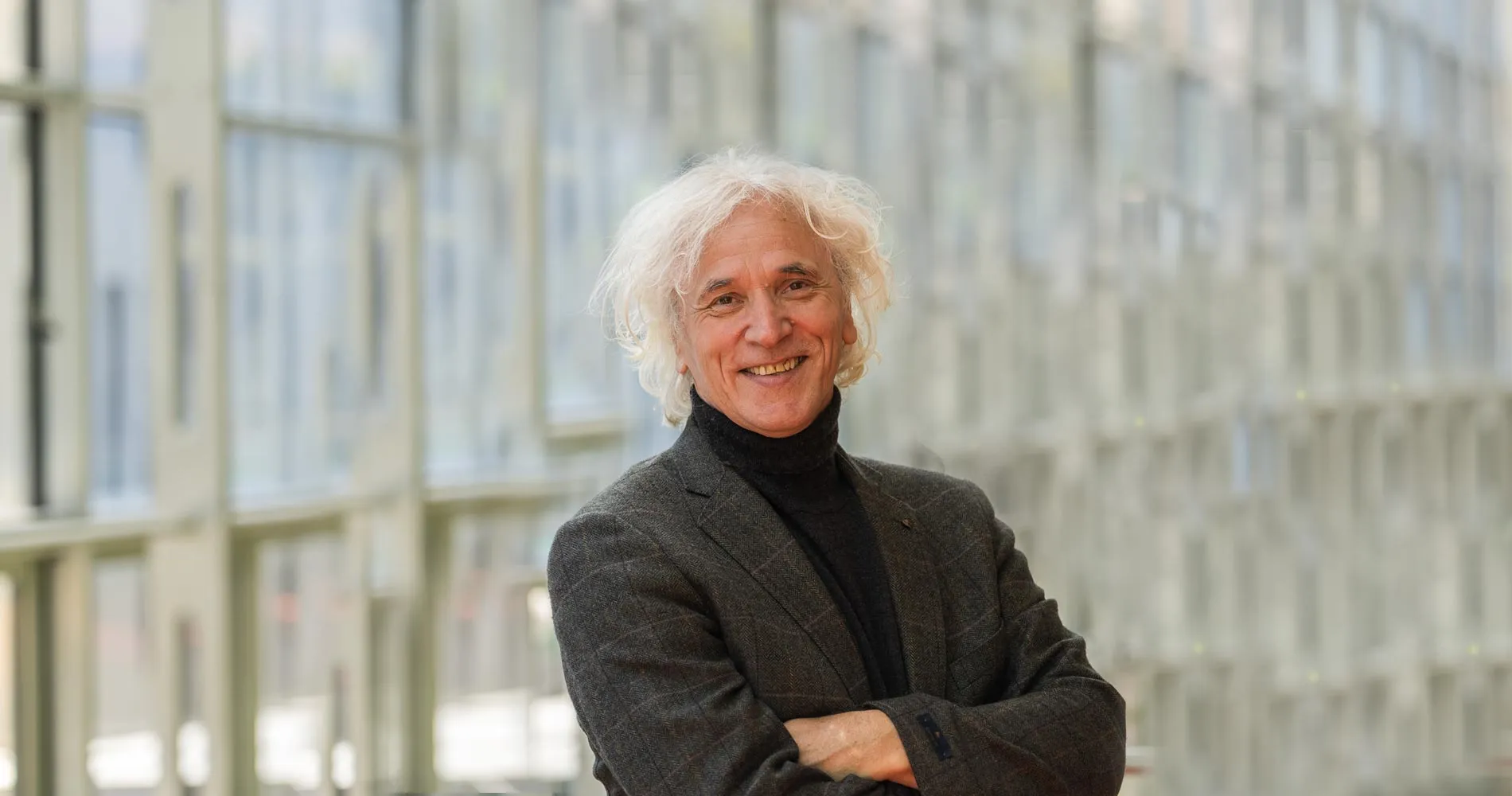Renowned geneticist Professor Josef Penninger gave iGlobenews an exclusive interview. He offered insights into his research, current startup projects and the new Erich Kandel Institute for Precision Medicine of the Medical University of Vienna (MedUni) which will startup in 2026. Penninger is among the top 10 most-cited scientists in the world and has received many prestigious awards including the Wittgenstein Prize, also referred to as the Austrian Nobel Prize.
Diana Mautner Markhof and Frances Mautner Markhof,
5 December 2023
Chinese version | German version
Professor Josef Penninger gave iGlobenews an exclusive interview on 17 November 2023. The topics discussed ranged from his groundbreaking research on bacteria and virus DNA to his exciting new startups in precision medicine.
Professor Penninger is one of the top geneticists in the world. He was born in a small town in Upper Austria, attended medical school in Innsbruck, and was a post-doctoral fellow at the Ontario Cancer Institute. In 2002, he was the founding director of the Institute for Molecular Biotechnology (IMBA), a research institute of the Austrian Academy of Sciences in Vienna. He also served as Scientific Director of the Life Sciences Institute at the University of British Columbia from 2018 to 2023. Professor Penninger holds professorships at the University of British Columbia in Vancouver and the University of Toronto.
In July 2023, he was appointed as Scientific Director of the Helmholtz Center for Infection Research in Germany and Adjunct Professor for Precision Medicine at the Eric Kandel Institute for Precision Medicine of the Medical University of Vienna.
The list of his awards is long. He has received numerous prestigious competitive research grants in the EU and North America. Moreover, he was awarded two Honorary Professorships by the Chinese University of Qingdao. Professor Penninger is a recipient of the Austrian Cross of Merit and he was Austrian of the Year in 2020. He was awarded the Ernst-Jung-Prize for Medicine, the Descartes Prize, which is the highest EU research prize, and the Wittgenstein Prize, also referred to as the Austrian Nobel Prize.
In 2015, Professor Penninger placed 11th as the most influential thought leader in German-speaking countries. He has a total of 769 lifetime publications, which have been cited 91 536 times. Worldwide, he is among the top 10 of the most-cited scientists.
iGlobenews: You have lived, studied, and worked in Austria, Germany, Canada, and the US. Where is home for you?
Prof. Josef Penninger: It’s hard to tell. I actually left the little village where I came from when I was 10; I went to a boarding school. After that, I went to medical school. I have a mystical place of home – the hill country in Austria. But otherwise, I’ve lived all over the world, and I really like Vancouver. I have my retreat there where I take care of my garden. Vancouver feels most like home.
iGlobenews: But you must have a special place for Austria?
Prof. Josef Penninger: Always. Especially after living abroad for many years. I lived in North America for 17 years. It’s important to know where you come from, what your roots are. You meet many people around the world, lots of amazing intelligent people, but I will always be Austrian. I love Vienna; it’s a great city with great art, education, and universities. I still have a house here, and my kids grew up in Vienna. They are true Austrian-Canadians. They were born in Canada but went to school in Vienna.
iGlobenews: Could you please explain to our listeners what personalized medicine is, and do you consider personalized or precision medicine as a megatrend of the future?
Prof. Josef Penninger: Yes, absolutely. Everyone is different. The four letters of the genetic code define all life on the planet, four billion years of evolution. Out of four letters, nature made plants, worms, bacteria, viruses, and of course, us humans, over the millennia and billions of years of evolution. We are all different.
But new technologies have developed to read genomes. Thirty years ago, our technology to read the genetic code – which contains three billion letters–would have taken 2000 years with the technology we had. Now, [technology allows us to] read the genetic code in 10 minutes [and it is] much cheaper. We can read the genetics for all the people, see the diversity of pre-combined genomes. It’s the first time in history we can do this. The other thing is that we learned not only to read genes from bacteria, plants, animals, and humans, but also to actively change them. The third thing that happened is we learned through science how to turn back biological time.
Of course, out of stem cells, we can engineer little hearts and little brains, blood vessels, which we have been doing. The world has fundamentally changed. We have now a very special unique opportunity not just to make medicine that fits millions, but really to make medicine for a particular person. Knowing the genetic code, using data, and using AI, we can design new medicines or drugs specifically. Glorious times. Renaissance of biomedical research.
iGlobenews: So you found the key to staying younger?
Prof. Josef Penninger: If I had found one, it would be great, but not yet. I am running a science advisory board for a French initiative on ageing. What we need now is to figure out how to keep people out of nursing homes longer. It’s not about living to 100, but it’s about having a population that ages healthily, which we could achieve.
iGlobenews: What are the areas of precision medicine on which your department at the Eric Kandel Institute for Precision Medicine focuses and with what results? Are AI and digitalization involved in your R&D?
Prof. Josef Penninger: Eric Kandel won the Nobel Prize for neurobiology in 2000 and is probably one of the most famous neurobiologists. Precision medicine is revolutionizing all parts of medicine, including cancer treatment, where a tumor can be examined for its genetic code to see if it has sensitivities to particular drugs, which can then be developed accordingly. It also plays a significant role in cardiology and infection research, as COVID-19 taught us that some people get sicker than others due to their genetic sensitivities and susceptibility to diseases and infections. Ultimately, we aim to develop a world-class institute. Neurobiology and human tissue engineering are very important here in Vienna, which is one of the best places for tissue engineering. We can compete globally.
iGlobenews: Is the plan to make Vienna a global center for precision medicine?
Prof. Josef Penninger: Yes, certainly. Vienna has already been at the forefront of medical biology for over a century.
iGlobenews: What percent of your time is spent at the Eric Kandel Institute and at the Helmholtz Center?
Prof. Josef Penninger: The Helmholtz Center is a very different job. It’s the largest center for infection research in Europe. We have 250 people making antibiotics, research stations in Africa observing gorillas and chimpanzees, and catching bats to find the next virus. With 70 people in epidemiology, we’re preparing for the next pandemic or epidemic and figuring out how to keep our hospitals open. It’s a fascinating project. We work closely with patients, and I’m trying to change the organization by hiring new talent and altering our vision of viruses and bacteria.
We’ve identified 30 000 types of bacteria, but the estimate is that there are 1.7 billion types on the planet. Bacteria have been evolving for 3.8 billion years. A friend from Harvard said, “Humans are crappy chemists,” because the chemistry we create in our bodies is not as sophisticated as that of bacteria, which are incredible chemists. For example, there are bacteria that can break down plastic.
We aim to explore super polluted sites or thawing areas where bacteria are emerging from thousands of years of frost. We plan to use viruses and our knowledge of bacteria to foster new science and technologies that could potentially change the world. Imagine a future where everyone has a fuel tank of bacteria in their basement that replaces gas and oil, radically changing the fabric of the world as we know it. That’s what I’m striving to achieve at the Helmholtz Center.
We also have several years to set up the Eric Kandel Institute for new research, which will open in three years. This gives us time to lay the groundwork, establish a direction, and decide whom to hire. It’s always been important to me to set clear expectations for where we want to be. I aim to be at the top, competing in the champions league of science. Reaching the top is challenging, but if you have a clear goal, you can build the steps and make changes. You might not always succeed, but at least you can take a shot.
iGlobenews: We are aware you are involved in various startups so that key results of your medical research become commercially available. Do any of these startups involve new drugs or therapies? Could you please elaborate on the nature of your startups, the stages of development they are in, and your future plans?
Prof. Josef Penninger: When I had my first position at the University of Toronto, it was in collaboration with Amgen, which later became the largest biotech company in the world. We developed a drug based on genome research that generated over 5 billion dollars. I’ve always been engaged with companies and was never intimidated by the corporate world. It’s essential to understand what they want and what you want. You have to define expectations and boundaries.
When I moved to Austria after learning from the best, I started my own company. I invested my own money and hired a team. One of the companies became one of the most successful biotech firms in Europe, developing a drug approved for children’s cancer. It’s one of the few biotech companies that’s profitable, which I’m very proud of. I’ve been involved in every stage, from starting the company, hiring staff, mortgaging my house to pay salaries and conducting clinical trials – through both bad times and good times.
I’m interested in continuous development, so I started two more biotech companies. One of them, JLP Health, developed a technology that allows us to simulate four billion years of evolution in one afternoon and understand more about the drugs, why they work, and what their targets are. We can identify the drug targets in a completely blind fashion. We have a subsidiary in China to learn how the Chinese approach this task. It’s fascinating to see what they’ve been doing and how they finance new companies. I also started a new company called Angios, which specializes in tissue engineering, growing human blood vessels from stem cells. Based in Innsbruck with the support of the Tirolean government, we aim to continue our research on blood vessels. With 500 million people with diabetes and considering that 80% of the disease burden of diabetes is due to affected blood vessels, we have new technologies to address these issues.
iGlobenews: You use AI a lot in your research, would you say?
Prof. Josef Penninger: Not enough yet, but we do quite a bit already. I’m amazed by young scientists and how quickly the world is changing, and I’m impressed by how eagerly young scientists embrace AI and its speed. AI has incredible potential. For example, in cell biology, when we test drugs, it’s still early, but we can analyze millions of cells and check 50 different parameters within a single cell. What would take 10 years and hundreds of people, AI can accomplish in 10 minutes. It’s truly fascinating. Also, for precision, with lots of data and many people, AI helps identify patterns. People are using AI on brain scans for Alzheimer’s to detect patterns that no human could discern. AI can examine millions of images and interpret the data. However, every technology has its downside, such as the regulation of AI and how it should be used. It raises a moral question from my perspective, which I can’t fully answer. But I strongly believe that the benefits outweigh the negatives.
iGlobenews: Erwin Schrödinger, in his famous book “What is Life,” discusses the heredity mechanism and DNA and claimed that these could not be understood without involving quantum processes. This has led to a new research area, quantum biology. Could you tell us whether your department is involved in quantum biology and in what areas? Are there results?
Prof. Josef Penninger: We are not really involved in quantum biology yet; it’s a bit esoteric now. But it’s a valid science which should deliver results soon. Quantum computing will revolutionize the analysis of vast datasets. It would be great to have these capabilities. Otherwise, I can’t comment much. The impact of Schrödinger’s book was to introduce physics and quantification into the realm of biology, shifting it from subjective interpretations to objective measurements.
iGlobenews: A more difficult question, but of much interest to our audience, is the idea of quantum consciousness. Recent studies have shown that quantum processes, specifically quantum entanglement, investigated by Austrian Nobel Prize winner Anton Zeilinger, are involved in consciousness-related brain functions. These brain functions thus also operate non-classically, meaning consciousness is not simply classical and involves quantum phenomena. Could you provide some insights on your views regarding consciousness and its quantum aspects?
Prof. Josef Penninger: It’s a challenging question. With 300 billion cells and 100 billion neurons, the main question is how they work together so that we can get up in the morning, remember things, and function as a coherent whole. It is one of the central questions and interesting hypotheses in neuroscience. However, testing these hypotheses is not straightforward.
Eric Kandel, a renowned psychologist, stepped out of his comfort zone and used a snail model to understand the underlying mechanisms of how the brain works because it has a single synapse for every neuron. Researchers are trying to understand the nervous systems of worms and other small organisms, which have considerably fewer cells than humans, but even then we don’t fully understand them. The fly brain, with millions of cells, is much more complex than that of a worm. What is consciousness is a significant question for us, but it’s also tough to address due to its complexity. The brain is not binary; it’s circuitous.
There was a development of a brain-based computer chip that uses much less energy and power. Some aspects of how the brain operates are still beyond our understanding. But I am open to new, radical ideas. In the future, we might encounter breakthroughs in this area. Good science often happens on the edge—consider “Life on the Edge” by Jim Al-Khalili as an example.
iGlobenews: Thank you very much for this most interesting interview. We wish you much success as Director of the Kandel Institute for Precision Medicine and look forward to talking with you again in the near future about what will certainly be key new developments.







